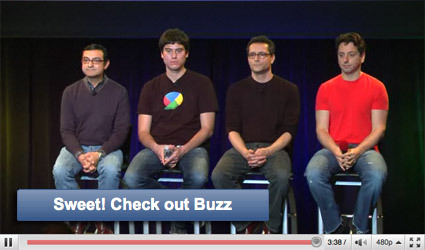Google Buzz: Another useful free application, more clutter -- or both?

You're 13 hours and 12 cups of coffee into your workday, you don't know how many browser windows or tabs you've got open. You have various instant messaging and voip applications running ...and something somewhere is buzzing or binging. How familiar is this scenario to you?
You're trying to keep the details of the telephone call you just had in your brain RAM, but now someone is popping up somewhere...you hunt through your desktop and there it is. GChat. 'Hey'. Chain of thought gone. 'Here' you type, and so begins another thread of small talk to distract you.
Sometimes your desktop seems like a telephone switchboard, with Skype, IM and email dinging, beeping and descending like Tetris blocks as the clock ticks on. Now we have a new distraction, Buzz, the Google knock off of Twitter et al baked into the free online ecosphere Google are crafting for you to live in.
Like the dog at the Saints SuperBowl party in the video above, we are at the mercy of the people we interact with, especially the ones we report to at work (whatever/wherever 'at work' means these days).
Google had the Chutzpah to let you insert Buzz straight into gMail today - no alpha launch like Wave, Labs add-on or 'rummage around in the list of apps Google bought and find something that fits your needs'. So now we have Google's 'Orkut' social network ('myOrkut beta' it says on my account), Wave, gMail, gTalk and now Buzz.
(If you'd like Buzz off there's a link a the base of your gMail window...for now...).
![]()
The Pavlov's dog conditioned reflex of all these dinging, binging devices can definitely make you 'merely react to a situation rather than using critical thinking', a description of the results of Pavlov's work, and prevent you concentrating on ore complex tasks.
The reality today is that software communication and collaboration tools are both free and ubiquitous: like mobile devices the personal cost involved is in obtaining a device and getting online. What we should all be metering more carefully - particularly in the context of work - is our time.
All these devices have value, the challenge is in using them efficiently and avoiding getting sucked into dialogs with people who seem to have plenty of time to hang out and chat. Services like Yammer, Saleforce Chatter and other Twitter like devices can be used in a disciplined way (so long as those you report to aren't constantly demanding reaction to trivia through these channels) but on the wide open web you're at the mercy of Twitter hustlers and, to be fair, all those fascinating snatches of conversation, links and intrigue that fly by.
I've been very busy in front of this monitor and/or on the phone for 12 hours straight so far today, and somehow still know all about Buzz, which is quite an impressive effort (I listened to a few minutes of the live event after a call got canceled and clicked around to invoke Buzz in my browser).

So, another day, another free application that may be useful or may clutter up your life. Or both. Organizing teams around the plethora of communication options isn't getting any easier - standardizing around a few devices is usually a good idea, but surprisingly hard to do...
![Reblog this post [with Zemanta]](http://img.zemanta.com/reblog_e.png?x-id=9d8b9e65-6ea5-4b5e-868a-d5548e088dee)